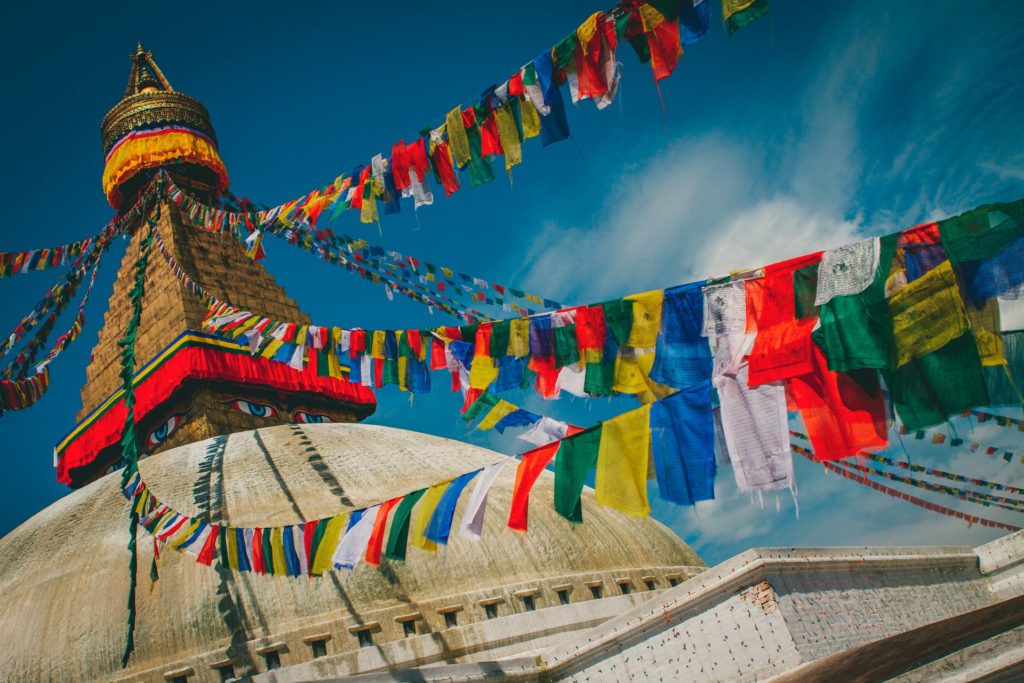Whether we realize it or not, our lives are spent running away from discomfort. We can run from it for a long time, but sooner or later fear, suffering and despair catch up with each one of us. After all, we live in a world of immense injustice, inequality and prejudice. We were yet again pushed to our limits with the latest news of the Russian invasion of Ukraine.
These are the times when we desperately need words of wisdom and consolidation. Buddhist philosophy has been guiding us for centuries on how to welcome the feelings of uncertainty and pain and transform them into valuable lessons. These five principles based on Buddhist philosophy show us how we can make meaning of our own suffering in a time of immense chaos in the world.
1. Welcome the unwelcome
Our attitude toward suffering matters a lot. The first instinct in the face of fear, anger and any kind of suffering is to close off, wall ourselves out and not welcome those painful feelings. In Buddhism, we are taught to apply the attitude of welcoming those parts of us with kindness and introspection. We can transform our world any transforming how we experience it.
“Trying to avoid what’s unpleasant seems to be deeply integrated in the human psyche,” writes Zen teacher Ezra Bayda. He calls us to drop the storyline: that, what we think should happen, what we think it means and what it does to us. “These moments are our opportunity to awaken,” according to Bayda.
By not running away from fear and discomfort we are accepting what is which can already ease our suffering. It’s what Vietnamese Buddhist master Thich Nhat Hanh calls: not going to battle with yourself.
2. Stay present
No matter how much we want it to be otherwise, the truth is we are not in control of the unfolding of our experiences, according to Sharon Salzberg. What we can control though, is how present we’re willing to be. Practicing mindfulness in those shaky times can allow us to see more clearly what is happening.
We can create space by sitting quietly in meditation or by practicing journaling. The key is not to silence those feelings, but to listen, let them scream at us. When we stay present we can distance ourselves from those hot, strong emotions and look at them from a perspective.
“To stay with that shakiness—to stay with a broken heart, with a rumbling stomach, with the feeling of hopelessness and wanting to get revenge—that is the path of true awakening. Sticking with that uncertainty, getting the knack of relaxing in the midst of chaos, learning not to panic—this is the spiritual path,” says Buddhist teacher Pema Chödrön.
3. Tap into gratitude
“Rejoicing in ordinary things is not sentimental or trite. It actually takes guts,” writes Pema Chödrön in her book The Places That Scare You: A Guide to Fearlessness in Difficult Times. Being grateful eases our heart, softens the strong emotions we can be experiencing and puts us back in touch with “the blessings of our surroundings.”
It also refocuses the mind towards the bigger picture. Things that we valued a lot, don’t matter as much. It gives us a chance to revisit our priorities and tap into what truly matters.
“Hard times remind us of what is important,” says American Soto Zen priest and poet Norman Fischer. It can be a moment where we take our minds from fixating on what is wrong, to appreciating what is right. It might bring our attention to things and people we wouldn’t otherwise notice, or appreciate.
4. Transform your pain into compassion
A lot of the pain in difficult times comes from a feeling of hopelessness. We feel like there’s nothing we can do. But that’s not true. That anger, sadness and fear can be transformed into the greatest gift of compassion.
“To be angry on behalf go those who are treated unjustly means that we have compassionate anger,” says the Tibetan spiritual leader Dalai Lama. This compassionate anger often pushes us to act against the inequality of the world. Without feeling pain, anger and fear we wouldn’t have been able to notice injustice, cruelty and tyranny and feel compassionate to its victims.
Compassion not only bridges the gap between us and others but also brings us closer to the heart of humanity. “Love and compassion are necessities, not luxuries. Without them, humanity cannot survive,” says the Dalai Lama.
5. Be of service
The hard times are often a great reminder of our interconnectedness, a proof that we are a part of a bigger picture. These are also the times when we’re pushed to wake up to the suffering of others. A strong emotional pain can take our focus from us onto someone in need who we can help.
A turmoil and chaos are when we can truly discover our goodness, our selflessness.
“Altruism includes a sense of responsibility,” says the Dalai Lama. That responsibility is our action. It’s a chance to truly be there for others. It calls us to practice our generosity and inspired action.
Thich Nhat Hanh proposes a practice of Abhaya, what the Buddhists call the gift of non-fear. When others experience fear, we can alleviate their pain by giving the gift of our peaceful, calm thoughts. “Offering a gift that helps people free of fear is the greatest gift you can give them,” says the Vietnamese master.
Get more like this—Sign up for our daily inspirational newsletter for exclusive content!
—
Photo: Raimond Klavins via Unsplash






